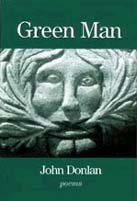Green Man

Green Man
by John Donlan
$15.95
- Autumn 1999
- ISBN 978-0-921870-66-1 (0-921870-66-3)
- 6″ x 9″ Trade Paperback, 84 pages
- Poetry
- Out of print
For thousands of years the image of the Green Man — foliage sprouting from his mouth to symbolize humanity’s unity with the natural world — has survived in European civilization. Invoking this spirit, John Donlan counsels: “Wear the earth as if it were your skin.” He writes of how “the wind’s voice, translated through the low/hiss of pine needles, says, ‘You belong.'”
But the wisdom of the Green Man is not easily won. Donlan’s poems, each recording the date of its completion, and published in the order in which they were written, constitute a kind of spiritual diary, a history and science of feeling. The first half of the book, structured in quintets, chronicles the struggle for self-understanding and personal growth. Destructive impulses insinuate themselves when least expected: “One voice says, ‘Watch your step’ and one says ‘Slip’.”
While seeking to embrace the ancient wisdom of the Green Man, Donlan knows that we must confront the bleakness of modern life, and consequently the second half of the volume is rooted in Vancouver’s East Side, where “clearcuts metastasize into neighbourhoods.” Throughout, however, Donlan’s imagery and cadenced language feeds our “hunger/for the beauty of the world.” Despite the holocaust being wreaked on the natural world, Donlan’s Green Man is written “against despair.”
Click here to read an excerpt from Green Man.
Reviews:
“There’s a species of aesthetic poise — we might call it musical intelligence — which comes about when discipline and surprise are working, not just in combination, but each for the other. I think of John Donlan’s poems as wise acrobats, alive to the many weathers of the self but equally well tuned to cityscape and landscape, performing athletic meditations inside a stillness they create for themselves. In Green Man we have a collection by one of our finest poets working at full stretch.”
—Don McKay



